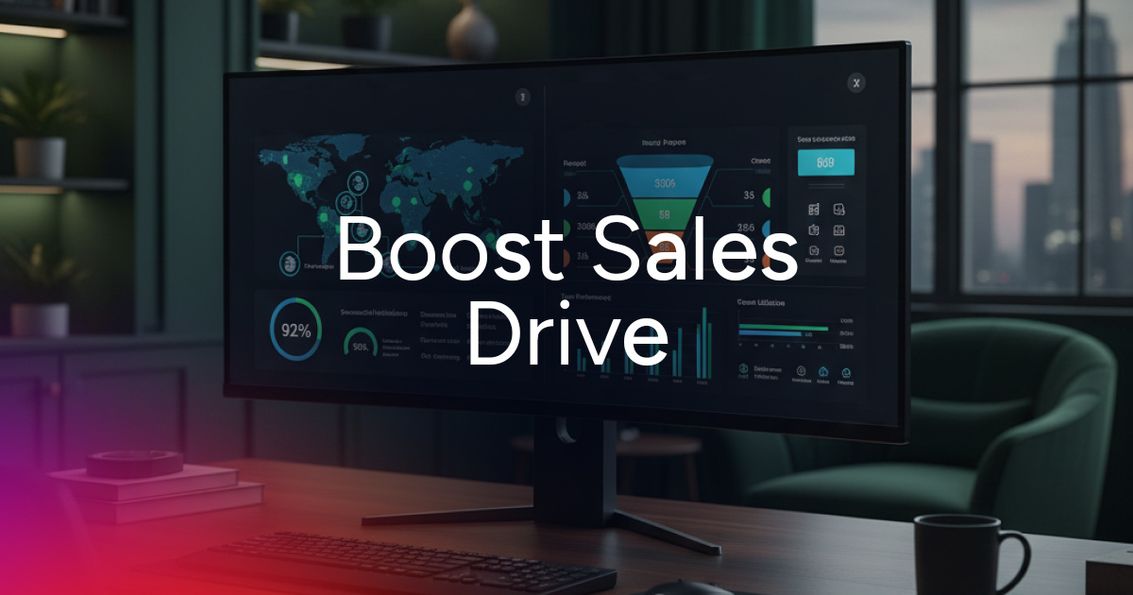As a sales leader, your team knows you expect them to hit their quota. But keeping reps engaged and motivated requires showing them what they can expect from you. Smart, strategic incentives that reward employees for achieving their goals keep teams engaged and willing to rally behind each other to succeed.
What Is a Sales Incentive Program?
A sales incentive program is a structured strategy that rewards sales teams for hitting specific goals beyond base compensation through monetary rewards (cash bonuses, gift cards, travel) or non-monetary recognition (public acknowledgment, professional development, career advancement). Commission is expected. Incentives are additive rewards that drive exceptional performance or specific behaviors by leveraging both extrinsic motivation (tangible prizes) and intrinsic motivation (recognition and growth opportunities).
The core components of an effective sales incentive program include:
Clear goals: Specific, measurable targets tied to business outcomes
Defined rewards: Prizes or recognition that match the effort required
Accurate measurement: Systems to track performance fairly
Transparent communication: Rules and standings visible to all participants
Why Sales Incentive Programs Matter for B2B Teams
B2B sales teams face distinct challenges that make incentive programs essential:
Long sales cycles: Sustained motivation required over months, not days
Complex deals: Cross-functional collaboration between SDRs, AEs, and Sales Engineers
Burnout risk: Quota-driven environments need recognition to prevent attrition
The right program keeps teams focused on revenue-driving behaviors while building collective energy through extended sales cycles.
Types of Sales Incentive Program Structures
Different team structures require different incentive designs. The right structure depends on deal complexity, team composition, and your sales motion. A transactional inside sales team needs different incentives than an enterprise field sales organization.
Structure Type | Best For | Example Payout Trigger |
|---|---|---|
Individual commission | Transactional sales, clear deal ownership | Percentage of closed deal value |
Tiered commission | High-volume teams, quota acceleration | Higher rates after hitting 100% of quota |
Team-based bonuses | Complex sales requiring collaboration | Collective revenue or pipeline target |
Activity-based SPIFs | Short-term behavior changes | Specific action completion (demos, feature adoption) |
Role-Specific Incentives for SDRs, AEs, and Sales Engineers
Misaligned incentives create friction across the sales team. SDRs book unqualified meetings to hit numbers. AEs ignore expansion opportunities because they only get paid on new logos. Sales Engineers get stretched thin with no recognition for technical wins.
Each role needs incentives tied to what they actually control:
SDRs: Meetings booked with qualified prospects, pipeline generated, conversion rates from meeting to opportunity
AEs: Closed-won revenue, deal velocity, average contract value, expansion attach rates
Sales Engineers: Technical close rate, proof-of-concept wins, expansion influence, customer satisfaction scores
When incentives align with role responsibilities, teams work together instead of against each other. SDRs pass better leads. AEs close faster. Sales Engineers focus on the deals that matter.
SPIFs for Short-Term Goals
A sales spiff (sales performance incentive fund) is a temporary bonus designed to drive short-term behaviors that deliver long-term value, such as feature adoption or competitive displacement.
Consider this example: Your company notices that customers who opt for a free add-on feature are less likely to churn than those who don't. You tell your reps to start upselling this product, and whoever achieves the most deals with this feature gets a monetary prize.
Even though the add-on doesn't result in immediate monetary gain, the behavior benefits your company in the long run.
Spiffs are also great incentives to motivate individual reps, but within a shorter time frame and typically with smaller rewards.
Common SPIF use cases include:
New product launches: Drive adoption of a feature or product line that needs market traction
Feature adoption: Encourage reps to sell add-ons or modules that improve retention
Competitive displacement: Reward reps for winning deals against specific competitors
End-of-quarter pushes: Create urgency to close pipeline sitting on the fence
Sales Incentive Ideas That Drive Results
The best incentive ideas combine clear goals with rewards that match the effort. Random prizes and one-off contests won't drive the results you're looking for. You need to make sure the prize matches the action.
Monetary vs. Non-Monetary Incentives
Monetary incentives spike short-term activity. Non-monetary incentives drive longer-term engagement. The best programs use both strategically based on the behavior you want to drive.
Monetary incentive examples include:
Cash bonuses: Direct payouts for hitting specific targets
Gift cards: Flexible rewards for smaller wins
Commission accelerators: Higher payout rates after quota attainment
Big-ticket prizes: High-value rewards for sustained performance
If you're asking sales people to come in every single day and grind and to exhibit that behavior all month, then you should have an incentive that aligns with the task.
This kind of incentive motivates individual reps to outperform their colleagues to get a grand prize that's well worth the effort they put in.
Non-monetary incentive examples include:
Public recognition: Shoutouts in team meetings, company-wide announcements
Extra PTO: Additional time off for top performers
Professional development: Conference tickets, training programs, certifications
Experiential rewards: Team dinners, exclusive events, travel opportunities
Team-Based Contests and Gamification
Team-based approaches unite the entire sales team around collective goals. ZoomInfo frequently hosts demo days where SDR teams schedule a target number of demos in one day, forcing collaboration to achieve ambitious objectives.
Call contests create infectious energy across the sales floor, according to Penney, who notes that hearing great phone calls happening around you drives everyone to perform better.
Uniting people around a cause promotes teamwork and increases communal energy.
ZoomInfo's sales team participated in a call contest, Call For the Cure, that raised money for medical research.
The harder the reps worked, the more our executive team was able to donate to good causes. It's an effective way to unite people.
Leaderboards also drive activity-based motivation by making performance visible across the team. When reps see where they stand, competition naturally follows.
Best Practices for Building a Sales Incentive Program
The best sales incentive programs are simple, fair, and tied to measurable outcomes. Complex rules kill participation, unclear measurement breeds resentment, and mismatched rewards waste budget.
Below are key strategies for building programs that drive performance:
Coordinate with Sales Ops on Metrics
Incentive programs fail when you can't accurately measure the behaviors you're trying to drive. Sales ops ensures your tracking infrastructure supports fair competition.
If you're trying to drive a specific behavior but you can't accurately measure that behavior, then the contest is worthless.
Sales ops delivers critical program infrastructure:
Clean CRM data: Accurate account and opportunity records
Transparent tracking: Real-time performance visibility
Fair reporting: Attribution rules everyone understands
Without that partnership, incentive programs become popularity contests instead of performance drivers.
For more on how clear expectations and structured pairing drive performance, see our guide on SDR-AE alignment.
Align Rewards with the Behavior You Want
Align the incentive type with the behavior you're driving. You wouldn't give away a Peloton for a couple of hours of work, and a $100 cash prize wouldn't be sufficient for a month-long blitz.
Month-long goals that require daily focus need significant rewards. Big effort deserves big rewards. Small wins deserve immediate recognition.
Why Recognition Often Beats Prizes
Sales incentives don't require massive budgets. Recognition drives performance, especially for newer reps who aren't yet at the top of the leaderboard.
Effective recognition tactics for new reps include:
Daily huddle highlights: Call out a great phone call or objection handling
Template sharing: Feature effective cold outreach emails the team can learn from
Name visibility: Introduce newer reps to the broader team through their wins
How to Launch and Communicate Your Incentive Program
Unclear rules kill participation faster than weak prizes. If reps don't understand how to win, they won't try. If they can't see where they stand, they'll assume they're losing.
Program rollout mechanics matter as much as the incentives themselves.
A successful launch checklist includes:
Rules documentation: Exactly what qualifies, how it's measured, and what the payout structure looks like
Kickoff announcement: Team meeting or video explaining the program and why it matters
Tracking dashboard: Real-time standings visibility so reps know where they stand
Weekly updates: Regular reminders with leaderboard snapshots and top performer highlights
Mid-point reset: Recognize leaders and re-energize teams falling behind at the halfway mark
Transparency builds trust. Weekly visibility maintains momentum. Mid-program communication prevents teams from giving up early.
How B2B Data Intelligence Powers Sales Incentive Programs
Accurate B2B data makes incentive programs fairer and more effective. Bad territory data penalizes reps before they make a single call. Inaccurate account segmentation creates fights over who owns what. Missing intent signals mean teams waste effort on accounts that aren't buying.
Here's how B2B intelligence fixes these problems and improves incentive program outcomes:
Firmographics and technographics: Fair territory assignment by company size, industry, and tech stack so reps compete on equal footing
Contact intelligence: Clear SDR vs. AE goal alignment when account segmentation is accurate and role-based targeting is precise
Buyer intent signals: Reward reps working high-priority accounts showing active buying behavior instead of cold outreach to dormant prospects
CRM enrichment: Automatic data updates keep account records current so performance tracking reflects reality
ZoomInfo Copilot enables reps to act on signals faster, which supports the behaviors programs are trying to drive. When reps know which accounts to prioritize, they focus effort where it matters most.
For more on how clear data-driven targets accelerate rep performance, see our approach to SDR training.
Drive Sales Performance with Smarter Incentive Programs
Effective incentive programs combine clear goals, fair measurement, and rewards that match the effort. Better data makes all three easier. When territory assignments are fair, tracking is accurate, and teams know which accounts matter, incentives drive the right behaviors. Talk to our team to learn how ZoomInfo can help you build incentive programs on accurate data.


